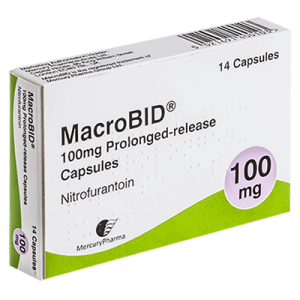Description
WHAT IS TRIMETHOPRIM?
Trimethoprim is an effective antibiotic treatment used for a variety of bacterial infections. Trimethoprim is available in 100mg and 200mg dosages and works to stop the growth of bacteria in the body, allowing your body to fight against the infection.
Although Trimethoprim is a multipurpose medication, it is particularly adept at treating urinary tract infections.
WHY TRIMETHOPRIM?
Trimethoprim is an effective way to clear uncomplicated cystitis infections. This prescription medication is capable of fighting the bacteria behind the infection and easing the symptoms within 24 hours. In most cases, the problem can be completely resolved within three days.
Trimethoprim tablets start to work within just a few hours, helping to eliminate symptoms fast. The medication has been clinically trialled and proven in its effectiveness too, as studies have shown it to be successful in treating UTIs.
Trimethoprim is also known to be highly effective and well tolerated. This means you experience a reduced risk of side effects.
Due to the growing resistance of bacteria to antibiotics, some patients may find that trimethoprim has reduced effectiveness against certain strains of bacteria.
HOW IT WORKS
An imbalance of the natural bacteria in our body often leads to a bacterial infection, and when this occurs around the urinary tract it forms a UTI. If the infection doesn’t dissipate on its own and instead travels through the tract into the bladder, it can cause further damage. This means that it is important to treat a UTI as soon as symptoms appear.
Trimethoprim works by stopping bacteria from producing folate (folic acid, vitamin B). Folate produces DNA to spread the infection further, so controlling the production of folate is important to your recovery. Once the production of folate has been stopped, your body can fight the existing bacteria and get rid of the infection.
Once the spread of the bacteria has been halted, painful symptoms such as abdominal pain and a burning sensation in the urethra will ease quickly.
Uses / Instructions
Trimethoprim should be taken as soon as you recognise the symptoms and have been diagnosed with cystitis. The sooner you begin your course of cystitis medication, the less severe your infection is likely to be.
Trimethoprim tablets can be taken for both acute and long-term infections. They should be swallowed whole, and can be taken with or without food.
Take one tablet twice a day for three days. Aim to take the tablets at the same time each day. As it is an antibiotic treatment, you should complete your entire course of cystitis medication even if your symptoms seem to have disappeared beforehand.
WHAT IF YOU FORGET TO TAKE A TABLET?
You should aim to complete your medication fully within the three-day period, but missing a dosage is nothing to worry about. If this does happen, simply take a dose when you remember or skip that dosage if you are close to the time when you should be taking your next tablet. Never take two tablets together to compensate for a missed dosage.
Warnings
Talk to your doctor or pharmacist before taking Trimethoprim Tablets if you:
• are pregnant
• suffer from kidney problems/kidney disease or are having dialysis treatment
• have a deficiency (are low) in folic acid (may cause anaemia)
• are at greater risk of high levels of potassium in your blood (hyperkalaemia), e.g. the elderly or those on higher doses
• are also taking repaglinide (medicine for treating diabetes)
• suffer from porphyria (a disorder that causes skin sensitivity to light, pain attacks and muscle weakness)
• Trimethoprim should not be given to premature babies or babies during the first few weeks of life.
You should let your doctor know and ask his/her advice if you suffer from or have ever had any of the above.
Trimethoprim can increase potassium blood levels. Patients at risk of increased potassium blood levels include those with kidney problems, poorly controlled diabetes, or those on certain medicines or potassium supplements. The symptoms of severe hyperkalaemia might include muscle cramps, irregular heart rhythm, diarrhoea, nausea, dizziness or headache. Your doctor may perform blood tests to monitor your potassium blood levels.
Your doctor may wish to do regular blood tests if you need long-term treatment or are prone to anaemia.
Read the patient information leaflet for a full list of warnings and precautions
Side Effects
As with most prescription medication, there is a risk of side effects when you take Trimethoprim. These side effects are usually temporary and mild to moderate. Side effects may include:
- Sore throat
- Skin rashes
- Loss of appetite
- Diarrhoea
- Anaemia
On very rare occasions, women who take Trimethoprim may experience the following side effects:
- Mouth ulcers
- Jaundice
- Vertigo
- Confusion
If you experience any of these side effects after you have completed your antibiotic medication, seek advice from your GP.
Read the patient information leaflet for a full list of side effects.







Reviews
There are no reviews yet.